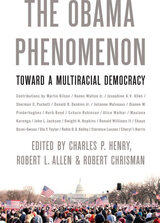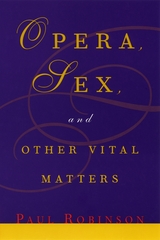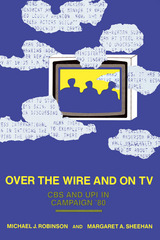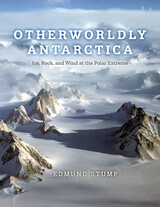170 books by Robinson and 4
start with O
170 books by Robinson and 4
170 books by Robinson
4 start with O start with O
4 start with O start with O

The Obama Phenomenon
Toward a Multiracial Democracy
Edited by Charles P. Henry, Robert L. Allen, and Robert Chrisman
University of Illinois Press, 2011
Barack Obama's campaign and electoral victory demonstrated the dynamic nature of American democracy. Beginning as a special issue of The Black Scholar, this probing collection illustrates the impact of "the Obama phenomenon" on the future of U.S. race relations through readings on Barack Obama's campaign as well as the idealism and pragmatism of the Obama administration. Some of the foremost scholars of African American politics and culture from an array of disciplines--including political science, theology, economics, history, journalism, sociology, cultural studies, and law--offer critical analyses of topics as diverse as Obama and the media, Obama’s connection with the hip hop community, the public's perception of first lady Michelle Obama, voter behavior, and the history of racial issues in presidential campaigns since the 1960s.
Contributors are Josephine A. V. Allen, Robert L. Allen, Herb Boyd, Donald R. Deskins Jr., Cheryl I. Harris, Charles P. Henry, Dwight N. Hopkins, John L. Jackson, Maulana Karenga, Robin D. G. Kelley, Martin Kilson, Clarence Lusane, Julianne Malveaux, Shaun Ossei-Owusu, Dianne M. Pinderhughes, Sherman C. Puckett, Scharn Robinson, Ula Y. Taylor, Alice Walker, Hanes Walton Jr., and Ronald Williams II.
[more]

Opera, Sex and Other Vital Matters
Paul Robinson
University of Chicago Press, 2002
Opera, Sex, and Other Vital Matters gathers both classic and never-before-published essays from one of the leading stylists in contemporary American letters, and one of our more revered public intellectuals, Paul Robinson. Diverse and elegant, the essays in this new collection showcase the sly wit and lightly worn erudition of their author. Each celebrates art and the flesh, directing us to the twin ecstasies of music and eros.
The essays on opera gathered here explore how masterpieces like Fidelio and The Magic Flute reflect the intellectual currents of their day. Be it the work of Verdi or Mozart, Wagner or Strauss, Robinson compels us to search for meaning not just in the lyrics of opera but also in the music. In melody, not libretto, we are more likely to discern key historical complexities and appreciate the way opera transcends language and time. The essays on sexuality, meanwhile, are ruminative, funny, and even moving. At one moment, Robinson measures whether homosexuality is the result of destiny or free choice. In another, he shares a touching exchange of letters with a gay student in the process of coming out. The final essays that encompass "other vital matters" find Robinson at his most incisive. Whether defending Freud as the most influential thinker of the twentieth century, attacking the dreaded use of semicolons, reflecting on his own mortality, or even meditating on the nature of cats, Sex, Opera, and Other Vital Matters is an eclectic work that will appeal to any reader interested in the continuing relevance of ideas to life.
The essays on opera gathered here explore how masterpieces like Fidelio and The Magic Flute reflect the intellectual currents of their day. Be it the work of Verdi or Mozart, Wagner or Strauss, Robinson compels us to search for meaning not just in the lyrics of opera but also in the music. In melody, not libretto, we are more likely to discern key historical complexities and appreciate the way opera transcends language and time. The essays on sexuality, meanwhile, are ruminative, funny, and even moving. At one moment, Robinson measures whether homosexuality is the result of destiny or free choice. In another, he shares a touching exchange of letters with a gay student in the process of coming out. The final essays that encompass "other vital matters" find Robinson at his most incisive. Whether defending Freud as the most influential thinker of the twentieth century, attacking the dreaded use of semicolons, reflecting on his own mortality, or even meditating on the nature of cats, Sex, Opera, and Other Vital Matters is an eclectic work that will appeal to any reader interested in the continuing relevance of ideas to life.
[more]

The Original Frankenstein
Mary Shelley (with Percy Shelley)
Bodleian Library Publishing, 2008

Over the Wire and on TV
CBS and UPI in Campaign '80
Michael J. Robinson
Russell Sage Foundation, 1983
First the press became the media, and now the media have become the Imperial Media—or have they? In this timely and comprehensive analysis, Michael Robinson and Margaret Sheehan examine how the news media behaved (or misbehaved) in covering the 1980 presidential campaign. Using the media's own traditional standards as a guide, Robinson and Sheehan measure the level of objectivity, fairness, seriousness, and criticism displayed by CBS News and United Press International between January and December of 1980. Drawing on statistical analyses of almost 6,000 news stories and dozens of interviews with writers and reporters, the authors reach convincing and sometimes surprising conclusions. They demonstrate, for example, that both CBS and UPI strictly avoided subjective assessments of the candidates and their positions on the issues. Both gave the major parties remarkably equal access. But the media seem to give more negative coverage to front-runners, treating serious challengers less harshly. Perhaps the most surprising finding is that networks were not more superficial than print; CBS attended to the issues at least as often as UPI. Robinson and Sheehan find television coverage more subjective, more volatile, and substantially more negative than traditional print. But CBS behaved neither imperially nor irresponsibly in Campaign '80. The networks did, however, emulate the more highly charged journalism of the eastern elite print press. By blending the quantitative techniques of social science and the tools of Washington-based journalism, Robinson and Sheehan have produced a book that will be essential reading for students and practitioners of politics, public opinion research, journalism, and communications. Lively and readable, it should also appeal to anyone interested in the role of the news media in contemporary politics.
[more]
READERS
Browse our collection.
PUBLISHERS
See BiblioVault's publisher services.
STUDENT SERVICES
Files for college accessibility offices.
UChicago Accessibility Resources
home | accessibility | search | about | contact us
BiblioVault ® 2001 - 2024
The University of Chicago Press









